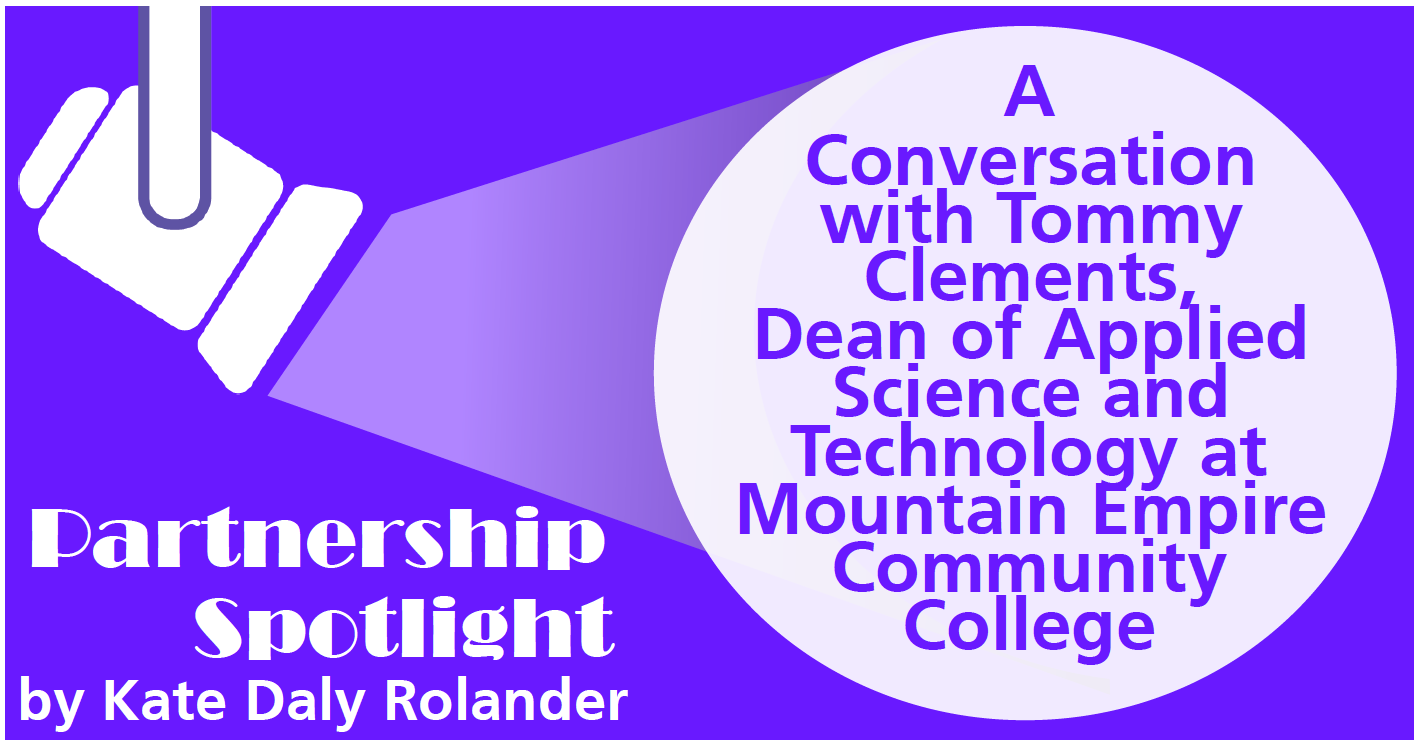A Conversation with Tommy Clements

Tommy Clements, who currently serves as the Dean of Applied Science and Technology at Mountain Empire Community College, has been a steadfast and valued partner of adult education over the last decade. A little over nine years ago, he partnered with two local adult education programs—Regional Adult and Career Education (RACE, Region 1) and the Southwest Regional Adult Education Program (Region 2)—to use the PluggedInVA model to build a weatherization program. Tommy was an expert in construction, but they didn’t have a curriculum. Using the National Center for Construction Education and Research (NCCER) credentialing programs, he and adult education providers participated in a contextualization workshop with the Virginia Adult Learning Resource Center to work together to integrate the occupational and academic skills into a single, cohesive program. Since then, he says, he tries to contextualize all of his instruction, with the understanding that “you can’t teach in a silo and expect it to be helpful…. If it’s personally significant to what you’re trying to learn, the other pieces make more sense.”
Since his first PluggedInVA experience, he has continued to partner with adult education, local Workforce Development Boards, the Department of Labor, Temporary Assistance for Needy Families (TANF) programs, and local employers to develop training programs that respond to industry needs. These collaborations have resulted in integrated education and training (IET) opportunities in weatherization, construction, electrical trades, information technology, Emergency Medical Services (EMS) and C.N.A. training, and pharmacy technician training. Rebecca Scott, the regional program manager of RACE, commented on her experiences with Tommy, reflecting that “workforce development is not an easy assignment in rural economies that are struggling. Fortunately, Dean Clements and MECC are authentic partners in our work in the region. They demonstrate their support by sharing locations, joining us in innovation, and rolling up their sleeves to make the hard work of transformation successful. … MECC is always the first partner that we go to when we are looking for a regional solution for our learners.”
“Having a business partner is the biggest piece of making IET projects work.”
Tommy emphasized that for IET and other career pathways programs, having a business partner is the biggest piece of making these projects work: “Without a client who has a need, there’s not much to do.” He says that he’s learned that if he goes to an economic development meeting and there are no business representatives there, it won’t work: “If you don’t have them, you won’t be successful.” One construction company, in particular, was a very willing partner with their PluggedInVA programs, because they were pleased with the results, but it became difficult to do the same program again and again. He said it’s easy to exhaust a training program’s potential and lose interest from participants and from the industry. He has found that there is a limited appetite from participants for entry-level positions and there exist misperceptions about what initial wages will be. Even with clear explanations of potential career pathways and increased earnings after an initial period, he sometimes finds it hard to sell training and certifications that do not immediately yield significant financial gains. One way, he says, to make training programs more attractive is to secure the active participation of businesses, for example, in the form of paid interviews or guaranteed interviews upon completion.
He stresses that it is important to stay connected to other workforce development partners, to be at the table in case an opportunity comes up where there’s a need: “The more you’re aware of, the more opportunities you can take when you find them.” He emphasizes, too, that it is important to build programs to fit the needs of industries and workers rather than to build programs to fit specific funding opportunities. An important lesson Tommy has learned is that there are a lot of economic development entities that compete with one another, and that hurts all of us: “If we don’t get together and make some kind of regional movement in the same direction, then we’re hurting ourselves.” He says that it is the attitude of the college administration “that we do our best to partner with every service provider and every business in our area so we can move forward together.”
In our phone conversation, he shared that he has benefitted from good partnerships ever since he came to MECC, so he’s not familiar with what it’s like not to have them. He says that one of the greatest benefits of strong partnerships is being able to deliver the most resources to the people who need them. All of these different workforce development entities have available resources, but often people in need are unaware of most of them. By pooling resources, it’s easier to get them to the people who need them and make the most impact. He advocates that we need to come together and “understand the value of everybody’s contributions.”
Kate Daly Rolander is Workforce Instructional Specialist at the Virginia Adult Learning Resource Center.